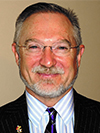Maintenance of Certification
 by Denis Knight, DO
by Denis Knight, DO
As part of a delegation of physician leaders from the Medical Society of Sedgwick County, I recently attended the Kansas Medical Society annual meeting in Topeka and participated in a members forum covering key topics facing physicians in Kansas. One of those topics was Maintenance of Certification, and it should, by my estimation, constitute a concern among most U.S. physicians.
The subject was also addressed in June at the annual conference of the American Medical Association, where in reference committees our leaders continued the struggle to come up with proposals to reform MOC into an effective and relevant means of assuring the public of physician competency.
The prevailing opinions expressed at both the AMA and KMS meetings indicate that the American Board of Medical Specialties in particular has been unresponsive to concerns that MOC fails to improve patient care and, worse, unnecessarily burdens physicians who choose to maintain their board certification. Several states have, in fact, introduced legislation to prohibit MOC from being the sole condition for licensure, employment, privileges, reimbursement or payer panel inclusion.
Personally, I have been practicing long enough that I benefit from the benevolent concept known as “grandfathering.” I have been able to maintain board certification without the periodic high-stakes examination and requisite review course or online preparation necessary to study for this exam. I have also not had to suffer the consternation of being required to know facts irrelevant to my practice of family medicine.
However, in my recent effort to gain state licensure outside of Kansas, I had to not only produce evidence of board certification but also take a Special Purpose Examination (SPEX), which is equivalent to Part III of the board examinations taken when I graduated from medical school 30 years ago. So I can appreciate and have experienced the expense of an online preparation course, the cost of the examination itself and the angst of having to pass a test containing questions not germane to my family medicine practice. In addition to the burdens of such a high-stakes exam, I am well aware of the rising cost of annual board membership fees. Although MOC is not considered in most cases to be the sole criteria for licensure, employment, privileges, reimbursement or payer panel inclusion, it remains an essential element of every credentialing application sent to me this year.
As physicians, we have a long-standing tradition of upholding standards of excellence through continuing education, demonstrated competence and self-regulation. The public we serve and the institutions in which we practice will continue to require assurance of our competence, so I do not expect MOC to be abolished. However, it is my conviction that practicing physicians can and must continue to press for MOC that is fair and affordable.


